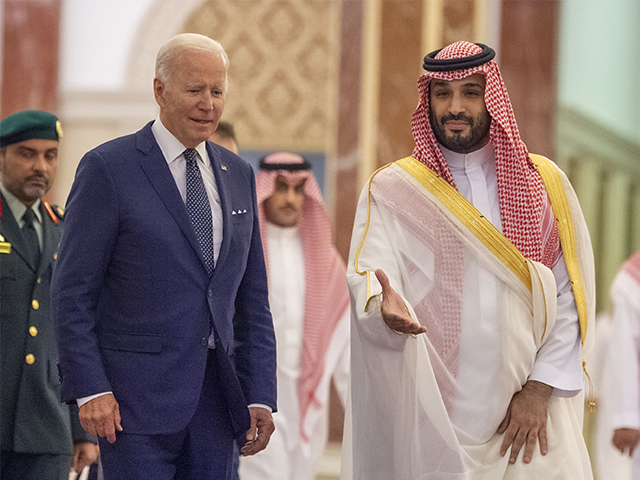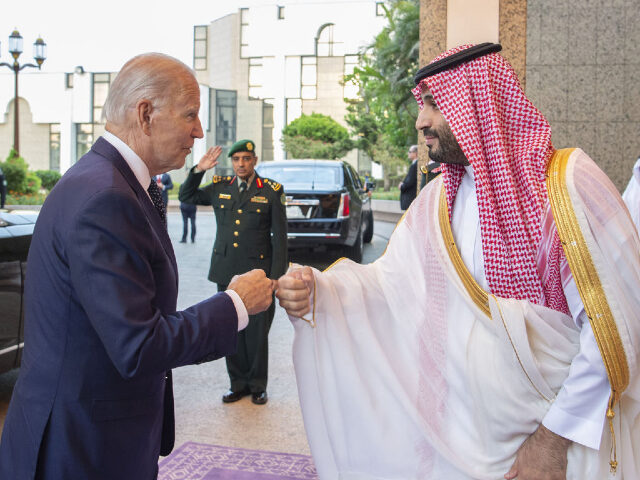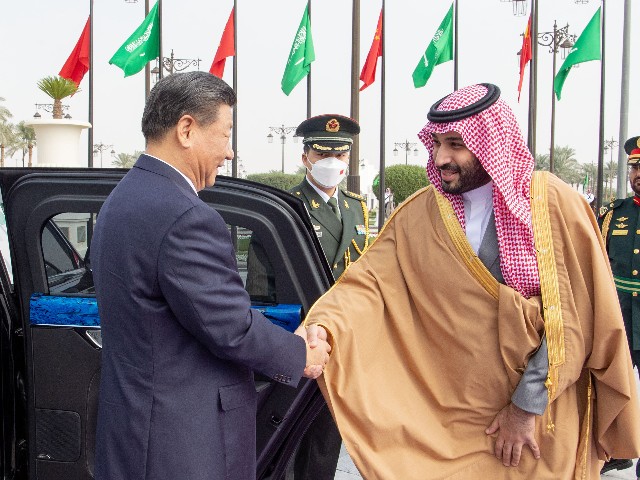President Joe Biden issued a statement this weekend thanking Saudi Arabia for “critical” aid in evacuating the American embassy in Khartoum, Sudan – a rare expression of praise for a country Biden promised as a presidential candidate to turn into a “pariah” nation.
The frenzied evacuation of the Khartoum embassy, alongside similar operations involving the diplomatic missions of other states, is the result of mounting hostilities between the Sudanese government and the Rapid Support Forces (RSF), a paramilitary consisting of many former members of the Janjaweed militias notorious for human rights atrocities during the Darfur war of the early 2000s. Sudanese civilian authorities have been attempting for years to integrate the RSF into the country’s armed forces – giving the government power over the group – but the RSF has insisted on operating independently, leading to an outburst of violence in the middle of April.
The violence has engulfed Khartoum, the embassy, resulting in the Biden administration’s decision on Saturday to abandon the embassy indefinitely.
“Today, on my orders, the United States military conducted an operation to extract U.S. Government personnel from Khartoum,” Biden said in a statement on Saturday. “I am proud of the extraordinary commitment of our Embassy staff, who performed their duties with courage and professionalism and embodied America’s friendship and connection with the people of Sudan.”
“I am grateful for the unmatched skill of our service members who successfully brought them to safety,” the statement continued. “And I thank Djibouti, Ethiopia, and Saudi Arabia, which were critical to the success of our operation.”
Biden concluded with a call to end the “unconscionable” violence erupting in the country with an “immediate and unconditional ceasefire.”
The Pentagon confirmed the extraction of “just under 100 American staff” from the Khartoum embassy on Sunday – and appeared to confirm reports that the White House would not help other Americans trapped in the country with a direct evacuation operation.
Christopher Maier, assistant secretary of Defense for special operations and low-intensity warfare, suggested the Defense Department would consider “actions that may include use of intelligence, surveillance and reconnaissance capabilities to be able to observe routes and detect threats,” allowing the creation of a safe land passage out of Sudan.
That safe passage currently does not exist, the American Khartoum embassy confirmed as one of its last messages before shutting down.
“Due to the uncertain security situation in Khartoum and closure of the airport, it is not currently safe to undertake a U.S. government-coordinated evacuation of private U.S. citizens,” the embassy warned this weekend shortly before closure. “We recommend carefully considering routes and the risks of travel, because roads may be crowded, exposed to combat operations, or have deteriorated infrastructure due to damage to bridges, roads, and facilities.”
“As a result of that uncertain security picture, as a result of the unavailability of the civilian airport, we don’t foresee coordinating a U.S. Government evacuation for our fellow citizens in Sudan at this time or in the coming days,” Under Secretary for Management Ambassador John Bass, a State Department official, told reporters following the embassy evacuation.
Reports indicate that about 16,000 Americans remain in Sudan at press time.
The Saudi Ministry of Foreign Affairs confirmed its participation in the evacuation of “several nationals of brotherly and friendly countries” out of Sudan this weekend. Its official statement on the operation notably omitted listing America as one of the “brotherly and friendly” nations:
#Statement | In the implementation of the directives of the Kingdom's Leadership, we are pleased to announce the safe arrival of the evacuated citizens of the Kingdom from Sudan and several nationals of brotherly & friendly countries, including diplomats & international officials pic.twitter.com/Eg0YemshYD
— Foreign Ministry 🇸 (@KSAmofaEN) April 22, 2023
“The number of citizens [of Saudi Arabia] who were evacuated reached 91 citizens, while the number of people who were evacuated from brotherly and friendly countries reached approximately 66,” the statement from the Foreign Ministry read, “representing the following nationalities (Kuwait, Qatar, the United Arab Emirates, Egypt, Tunisia, Pakistan, India, Bulgaria, Bangladesh, the Philippines, Canada, and Burkina Faso).”
Adding to the perception of a chill between Riyadh and Washington, the Foreign Affairs Ministry’s last press release before announcing the evacuations from Sudan described a friendly phone call between Saudi Crown Prince Mohammed bin Salman and Russian leader Vladimir Putin:
🇸📞🇷🇺 | HRH Crown Prince Mohammed bin Salman makes a phone call to Russian President Vladimir Putin. pic.twitter.com/6jKkwBI6ZR
— Foreign Ministry 🇸 (@KSAmofaEN) April 21, 2023
The RSF also issued a statement specifying that it did not object to the evacuation of Americans in an apparent attempt to avoid the conflict’s expansion to include U.S. involvement against it.
“The Rapid Support Forces Command has coordinated with the US Forces Mission consisting of 6 aircraft, for evacuating diplomats and their families on Sunday morning,” the RSF said in a statement posted to Twitter, according to the Qatari news network Al Jazeera. The paramilitary promised “full cooperation with all diplomatic missions, and providing all necessary means of protection, and ensuring their safe return to their countries.”
Bass, the State Department undersecretary, told reporters that the RSF’s cooperation consisted only in not attacking the civilians being evacuated, adding, “I would submit that’s as much in their self-interest as anything else.”
Al Jazeera noted that, according to initial reports this weekend, Saudi Arabia took in more than 150 people evacuating Sudan, about the number listed in the Foreign Ministry statement.
America’s reliance on Saudi Arabia to protect its diplomats follows years of erosion of trust between the two countries under Biden that stems from remarks he made before becoming president. In a 2019 presidential debate, Biden promised that, if elected, he would turn the traditional American Mideast ally into “the pariah that they are” on the world stage in response to the 2018 killing of Islamist Washington Post columnist Jamal Khashoggi, a longtime Saudi government critic, by Saudi officials. In addition to verbal insults, Biden also vowed to pursue an energy policy intended on eradicating the use of fossil fuels, by far Saudi Arabia’s most lucrative industry.
FLASHBACK — WaPo’s Ignatius: “Disturbing” Biden Gave MBS Immunity on Khashoggi that Trump Wouldn’t; “Humiliating” He’s Been Rejected on Oil
U.S.-Saudi relations worsened after Biden walked back his promise to ostracize the country and visited Saudi Arabia in July 2022. Greeting Mohammed bin Salman, the de facto ruler of the country, with a smile and a fist bump, Biden reportedly traveled to the country seeking an increase in Saudi oil production to offset rising prices as a result of Western sanctions on Russia’s oil industry. Biden vehemently denied in a Washington Post column that this was the purpose of his travel but, despite titling the column “Why I’m Going to Saudi Arabia,” never clearly explained why he was going to Saudi Arabia.
Once in Saudi Arabia, Biden said he had “a good discussion” with Saudi officials “on ensuring global energy security and adequate oil supplies to support global economic growth.”

President Joe Biden (L) being welcomed by Saudi Arabian Crown Prince Mohammed bin Salman (R) at Alsalam Royal Palace in Jeddah, Saudi Arabia on July 15, 2022 (Royal Court of Saudi Arabia/Getty Images).
In October, three months after Biden’s visit, Saudi Arabia supported a historic two-million-barrel-per-day cut in production by the oil cartel OPEC+. The group announced a further reduction in supply of 1.16 million barrels per day in early April. The Wall Street Journal reported in October that the production cut was partially the result of how poorly Biden’s visit to Saudi Arabia was received.
“Saudi officials dismissed the requests” with “a resounding no,” according to the newspaper, because “they viewed [the request] as a political gambit by the Biden administration to avoid bad news ahead of the U.S. midterm elections.”
The Biden administration responded to the initial oil cut by accusing Saudi Arabia of attempting to aid the Russian invasion of Ukraine, an offense that led to embarrassment for the White House when Ukrainian President Volodymyr Zelensky, following a phone call with Mohammed bin Salman, effusively praised Saudi Arabia for supporting his country.
The Saudi government has since focused on improving ties with China, America’s top geopolitical rival, preparing a lavish welcome for dictator Xi Jinping in December and granting China mediating authority in its relationship with Iran.


COMMENTS
Please let us know if you're having issues with commenting.